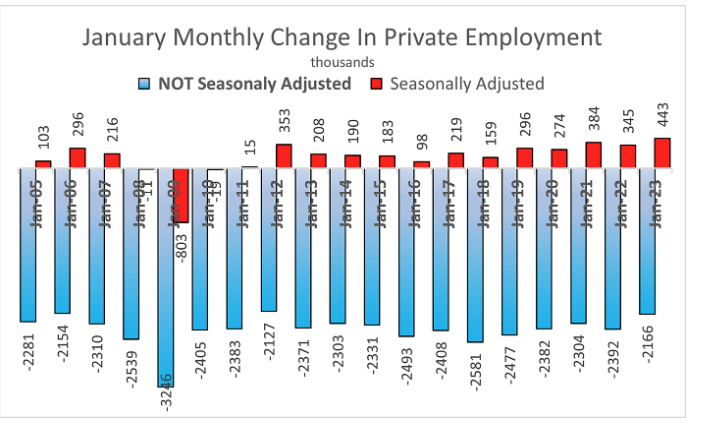
Simple answer to the title question: No.
The number of employees in the private sector actually fell by 2.166 million. So why did the BLS report a huge increase in jobs? Seasonal adjustment.
Alan Reynolds makes this point in “Can a Seasonal Adjustment to Lost Jobs Justify a Tighter Fed?,” Cato at Liberty, February 6, 2023.
The number of jobs virtually always falls between December and January as various retailers and producers lay people off whom they hired for the Thanksgiving to Christmas season.
Seasonal adjustment is handy and important. But you have to remember whether you’re citing seasonally adjusted data or actual data.

READER COMMENTS
nobody.really
Feb 7 2023 at 11:37am
Wow, that’s counter-intuitive. Thanks for flagging this; I’m gonna have to go eat some of my words.
Bill
Feb 7 2023 at 11:44am
An economist is waiting at a bus stop and notices a dejected young man sitting on a bench. She asks him what’s wrong, and he replies that summer is over, the place where he worked has closed for the winter, and he’s depressed to be out of work. The economist replies, “Don’t worry, then. Seasonally adjusted, you still have a job!”
David Henderson
Feb 7 2023 at 1:52pm
Great joke.
Scott Sumner
Feb 7 2023 at 12:09pm
I agree. It’s also worth emphasizing that the seasonably adjusted figures are the right ones to focus on when evaluating the business cycle. Each year, the Christmas shopping season creates a mini-boom, so when looking for underlying economic trends we need to look beyond that factor. Having said that, seasonal adjustments are often inaccurate. The problem is not that we seasonally adjust (we should) it’s that we don’t always do so accurately. All figures should be viewed with caution.
BTW, year over year figures do not have a seasonality problem, and they also show very strong jobs growth.
David Henderson
Feb 7 2023 at 1:52pm
All good points. Thank you, Scott.
Natalie Cohen
Feb 8 2023 at 9:57pm
thank you so much for writing on this. I have been tracking the un-seasonably adjusted numbers of local school employees for years, since the BLS adjusts a million school employee jobs up and down each year. My view is that seasonally adjusted teachers don’t shop or consume in other ways… and if one is trying to get the pulse of economic activity at least one should look at both adjusted and unadjusted. I’m not an economist, and an economist friend reprimanded me for making a mountain out of a molehill, but a 1 million job fluctuation seems meaningful to me. (Especially if you are doing a budget or planning based on the number of kids, seats and books you need)
David Henderson
Feb 9 2023 at 12:19pm
You’re welcome, Natalie.
Physecon
Feb 9 2023 at 11:11am
There’s so much to this question. Composition effects are so importanat. In some ways is a large drop in employment in Jan actually the sign of a stronger economy? If even more seasonal employment is demanded then that could be strength. To put it another way and paraphrase Scott’s always pertinent admonishment: never reason from a quantity change…at least in isolation!
Comments are closed.